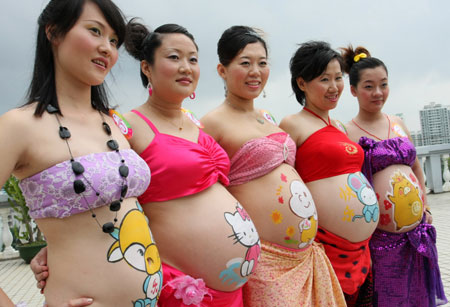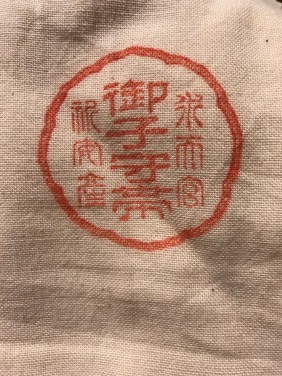
(Slightly condescending image of pregnant Japanese women; it was this or stock shots, sorry)
Do pregnant Japanese women eat sushi? The quick answer to that is yes, they do. The longer answer is that as a developed nation with modern medicine and the kind of modern economically privileged lifestyle we are familiar with the fact that pregnant women are not told to avoid raw fish is one of a number of recommendations that makes it clear how medicine along with all human endeavour is culturally mediated and some recommendations have more to do with culture and tradition than medical science. And that medical science is inextricably tied up with culture so it’s hard to separate the two anyway.
For example, here in the UK and across much of the West pregnant women are advised not to overheat. When I was pregnant with my first child we decided to go on a big holiday before all the fun was extinguished from our lives (as we feared). We went to California, hired a camper van and went on an amazing road trip. When we stumbled across some natural hot springs my excitement was ruined by the recommendation that pregnant women were not allowed. Signs around the springs stated:
‘We do not recommend bathing in the hot mineral pools during pregnancy, as the body requires no further heat or stimulation. Fully immersing your body in the warm water will raise your body temperature, which can be dangerous during pregnancy.’
Always a bit sceptical about pregnancy restrictions I actually went in anyway but only for very short dips and then lay around on the side worrying that I was being reckless. The Japanese on the other hand recommend hot baths to soothe pregnant women’s aches and pains and the traditional hot springs or onsen are also visited by pregnant women. In general keeping the baby warm in utero is emphasised and older women will chide a pregnant woman for not wearing socks even on a hot day.
Midwives especially but also doctors recommend pregnant women wear the hara obi, a firm tummy wrap, in order to support their backs and hips from around the fifth month of pregnancy. However, this comes from a centuries long tradition which also claimed the wrap kept the baby warm and small for an easier birth. Traditional hara obi are 10m long white pieces of cloth that are taken to the temple for blessing on Dog Day (because dog’s give birth easily). Now you can buy velcro ones from Muji and along with wearing layers and socks, many Japanese women still endeavour to keep warm whilst here in the UK we do our best not to overheat.

(A Japanese friend of mine in London was sent this pic by a friend at home, it’s the hara obi with the temple blessing stamped on it)
Another example of how medical advice is culturally shaped is weight gain in pregnant women. As I mentioned, the hara obi was also intended to keep the baby small to ease birth. Whilst this is not medically recommended at all anymore, women are nonetheless highly discouraged from gaining too much weight. In the West, we are cautioned to not overeat and told that eating for two is a myth, but nonetheless pregnant women are indulged in their cravings and are expected to put on weight. In Japan doctors, midwives and family members will all stress how a pregnant women should watch what she eats. The medical advice is sound but the reasoning has a lot more to do with a long held belief that a small baby is the ideal outcome and that an overweight expectant mother will find labour much harder. Laura, an American woman in Japan, recounts ‘I was told I’d have too fat a vagina to deliver vaginally, that my child would be too big and that I’d never ever be able to lose the weight,” (Japan Times: 2015).
So whilst the recommended weight gain for pregnant women is roughly the same both in Japan and the UK, culturally in the UK we encourage women to eat when pregnant and in Japan they are discouraged. This results in related health problems in both cultures with most women in the West struggling to lose the weight after childbirth, higher rates of diabetes and heart conditions etc and in Japan babies are being born with lower and lower birth rates in recent years as a result of women wanting to stay slim.
As for staying warm, it turns out that there is some new evidence that keeping your lower body warm and upper body cool is beneficial, which rather neatly means that both medical camps are partially right! Phew! Hopefully I’ve not offended anyone in that case.
Loads of links for this one:
Fun blog: http://borninjapan.net/2008/11/07/leaking-culture/
List of some of the rituals and ceremonies to do with pregnancy and birth and the first year of a child: http://seattlebuddhist.org/our-services/baby-rituals
An academic paper on pregnancy in Japan: http://www.jstor.org/stable/20027269?seq=3#page_scan_tab_contents
Study showing that emphasis on slimness has brought down average weight of new borns in Japan and is potentially a health problem: https://www.ncbi.nlm.nih.gov/pmc/articles/PMC5047016/
Strict restriction of weight gain during pregnancy is not effective in reducing perinatal complications: http://www.sciencedirect.com/science/article/pii/S0301211506004532
Academic article on the hara obi:
http://booksandjournals.brillonline.com/content/journals/10.1163/157342109×568937
Great article, I love to learn about cultural believes and customs through your anthropology parenting blog. Thank you for this precious information that I think helps to keep us with an open mind or, as I like to say, to be cultural intelligent people.
LikeLike
Thank you Lola! And ‘culturally intelligent’ is a great way to put it!
LikeLike